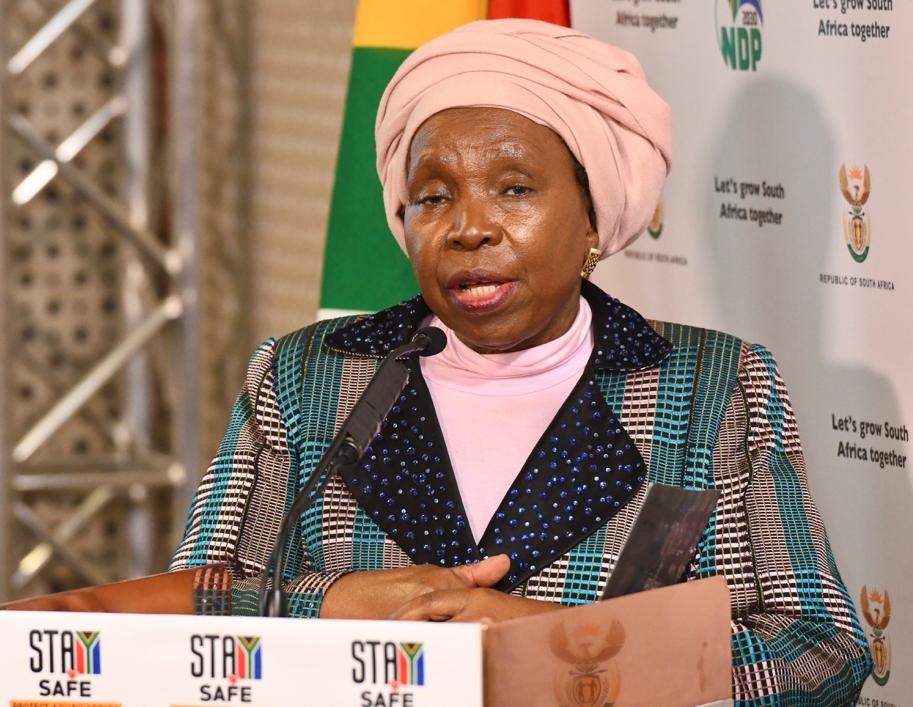


Cooperative Governance and Traditional Affairs Minister Nkosazana Dlamini-Zuma.
- It is misleading to describe Minister Nkosazana Dlamini-Zuma’s actions in drawing up regulations as authoritarian, the Western Cape High Court ruled.
- The court dismissed an application to have the NCCC declared unconstitutional and the lockdown regulations invalid.
- In doing so, it provided further clarity on the standing of the NCCC.
To cast Minister of Cooperative Governance and Traditional Affairs Nkosazana Dlamini-Zuma’s conduct as authoritarian is misleading, the Western Cape High Court found.
The court also provided legal clarity on the standing of the National Coronavirus Command Council (NCCC) when it dismissed an application to have the NCCC declared unconstitutional, and also dismissed the application to have the lockdown regulations declared invalid.
Last month, Mpiyakhe Dlamini, Duwayne Esau, Tami Jackson, Lindo Khuzwayo, Mikhail Manuel, Neo Mkwane, Scott Roberts and Riaan Salie brought the application.
Dlamini-Zuma, President Cyril Ramaphosa, Minister of Trade and Industry Ebrahim Patel, the NCCC, and the Disaster Management Centre were the respondents.
“I am not persuaded that [the] applicants are entitled to any of the relief they seek,” Judge Rosheni Allie wrote in her judgment, handed down on Friday.
Judge Elizabeth Baartman agreed with the ruling.
When arguments were heard in the case, the respondents challenged the rationality of the government’s regulations for the Level 4 lockdown due to the short time allowed for public participation.
Misleading
Allie noted that the Disaster Management Act doesn’t require a public participation process.
“Her modus operandi was to consult with colleagues, Nat Joints, the [Disaster Management] Centre, the advisory council, other spheres of government and organs of state, and she had regard to inputs from the public that she had access to,” Allie wrote.
Allie added:
“To caste her conduct as authoritarian is misleading and patently inappropriate as that assertion is not borne out by objectively determinable facts…”
Since the declaration of the state of disaster, and Ramaphosa’s announcement that the NCCC will coordinate the government’s response to the pandemic, there were many questions about the NCCC’s constitutional standing.
In recent responses to written parliamentary questions, Ramaphosa provided some clarification on the NCCC, stating that it was established as a committee of Cabinet, and that all ministers belong to it.
Dlamini-Zuma, in her responding papers in this case, provided unprecedented detail on the workings of the NCCC, and also admitted that, given the numerous public statements that attributed government decisions to the NCCC, it was understandable there was confusion around it.
NCCC
In her judgment, Allie provided further clarity on the NCCC.
“Respondents state that the NCCC is a committee of Cabinet working exclusively on Covid-19 related issues. They assert to exercise their right to organise Cabinet into working committee for specific purposes and they do not rely on legislative authority to do so. They also allege Cabinet takes collective decisions on issues discussed in the NCCC, where they are required to do so, and individual Cabinet members similarly take decisions that emanate from discussions at the NCCC when they are required to do so,” Allie wrote.
“There are no grounds on which to second-guess those allegations made by the respondents because applicants have produced no evidence to gainsay those allegations. Instead, they rely on pure conjecture.”
She noted in terms of Section 101 of the Constitution, the president does not have to establish a committee such as the NCCC in writing. She also said the Promotion of Access to Information Act (PAIA) protects the confidentiality of Cabinet meetings.
“When the minister asserts that minutes of Cabinet meetings as well those of its committees, including the NCCC, are confidential, there is nothing sinister or un-transparent about it.
“Confidentiality is the mechanism by which Cabinet protects the integrity of its discussions.”
No basis for application
She found Ramaphosa’s “decision to establish the NCCC is neither a decision made in terms of legislation nor are the decisions of the NCCC capable of having legal consequences because they are subject to acceptance, rejection or modification by Cabinet and, where applicable, individual Cabinet members”.
She said there was no legislative imperative on Dlamini-Zuma to consult with the whole Cabinet.
Yet, the decision to make regulations were part of a deliberative, consultative process.
Allie wrote:
“The ultimate decision as to the formulation of disaster management regulations were made by the minister concerned, alone. There is nothing extraordinary about that. The Act provided that the relevant minister make that decision alone.”
It is artificial to sever the minister’s final decision from the deliberative process that preceded it.
She found no basis for the applicants’ assertion that the NCCC usurped the Disaster Management Centre’s powers.
Friday was a good day in court for Dlamini-Zuma and the government, as the High Court in Pretoria dismissed, with costs, an application by the Fair Trade Independent Tobacco Association to have the government’s ban on the sale of tobacco products overturned.

